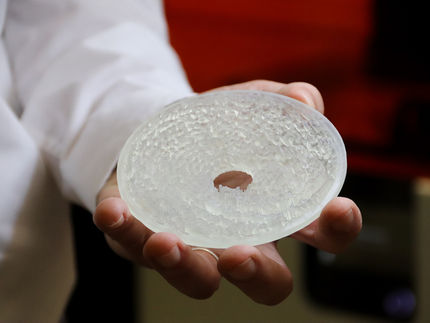Better Insight into Brain Anatomical Structures
Manganese oxide nanoparticles as contrast agents for brain magnetic resonance imaging
magnetic resonance imaging is a very effective method for revealing anatomical details of soft tissues. contrast agents can help to make these images even clearer and allow physiological processes to be followed in real time. Conventional gadolinium complexes currently used as MRI contrast agent cannot reveal anatomic structures. As reported in the journal Angewandte Chemie, Korean researchers led by Jung Hee Lee at Samsung Medical Center and Taeghwan Hyeon at Seoul National University have now developed a new MRI contrast agent using manganese oxide nanoparticles that produces images of the anatomic structures of mouse brain which are as clear as those obtained by histological examination.
Magnetic resonance images after injection of the manganese oxide nanoparticles gave a view into different areas of the mouse brains - in excellent resolution. "We have developed the first truly biocompatible MRI contrast agent for anatomical brain imaging," Lee and Hyeon point out. "With this agent, we are able to get high-contrast views of the anatomical details of live mouse brain." The researchers hope that their new contrast agent will allow better research and diagnosis of brain diseases involving the CNS (central nervous system), such as Alzheimer's disease, Parkinson's disease, strokes, and tumors.
Furthermore, the Korean team was able to attach antibodies to the manganese oxide nanoparticles. These antibodies recognize and specifically bind to receptors on the surface of breast cancer cells. In mouse brains with breast cancer metastases, the tumors were clearly highlighted by the antibody-coupled contrast agent. The same principle should allow other disease-related changes or physiological systems to be visualized by using the appropriate antibodies.
Original publication: Taeghwan Hyeon et al.; "Development of a T1 Contrast Agent for Magnetic Resonance Imaging Using MnO Nanoparticles"; Angewandte Chemie International Edition 2007.
Most read news
Topics
Organizations
Other news from the department science

Get the life science industry in your inbox
By submitting this form you agree that LUMITOS AG will send you the newsletter(s) selected above by email. Your data will not be passed on to third parties. Your data will be stored and processed in accordance with our data protection regulations. LUMITOS may contact you by email for the purpose of advertising or market and opinion surveys. You can revoke your consent at any time without giving reasons to LUMITOS AG, Ernst-Augustin-Str. 2, 12489 Berlin, Germany or by e-mail at revoke@lumitos.com with effect for the future. In addition, each email contains a link to unsubscribe from the corresponding newsletter.
More news from our other portals
See the theme worlds for related content
Topic world Antibodies
Antibodies are specialized molecules of our immune system that can specifically recognize and neutralize pathogens or foreign substances. Antibody research in biotech and pharma has recognized this natural defense potential and is working intensively to make it therapeutically useful. From monoclonal antibodies used against cancer or autoimmune diseases to antibody-drug conjugates that specifically transport drugs to disease cells - the possibilities are enormous

Topic world Antibodies
Antibodies are specialized molecules of our immune system that can specifically recognize and neutralize pathogens or foreign substances. Antibody research in biotech and pharma has recognized this natural defense potential and is working intensively to make it therapeutically useful. From monoclonal antibodies used against cancer or autoimmune diseases to antibody-drug conjugates that specifically transport drugs to disease cells - the possibilities are enormous




















































